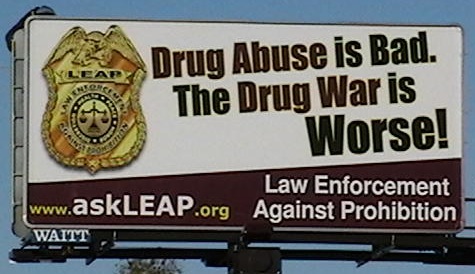Law enforcement organization opposes War on Drugs

It's called LEAP: Law Enforcement Against Prohibition. With a growing army of law enforcement and criminal justice personnel who actually support legalizing drugs like marijuana, this public policy initiative is starting to gain traction.
On its website, LEAP describes itself as "current and former members of the law enforcement and criminal justice communities who are speaking out about the failures of our existing drug policies." What are those failures? LEAP says:
By continuing to fight the so-called 'War on Drugs', the US government has worsened these problems of society instead of alleviating them. A system of regulation and control of these substances (by the government, replacing the current system of control by the black market) would be a less harmful, less costly, more ethical and more effective public policy.
Just who are these law enforcement and criminal justice officials, and do they really want to legalize drugs? Judge Jim Gray served as a Superior Court judge in Orange County for 25 years. Speaking in favor of the Regulate, Control, and Tax Cannabis Act of 2010, Judge Gray recently had this to say:
California simply can't afford to continue to waste hundreds of millions of dollars and countless hours of law enforcement time targeting non-violent cannabis consumers who have hurt no one. Our police waste countless hours targeting and arresting non-violent cannabis consumers. Those arrested are then sent to court, where judges waste countless hours hearing their cases and sentencing them. Then they wind up in jail, where we waste hundreds of millions of dollars incarcerating them.
But the judge goes even further. For Judge Gray, legalizing the cultivation, sale, and recreational use of marijuana is not only an effective way to help balance California's battered budget, it will actually make Californians safer. In a recent advertisement for the Tax Cannabis initiative, Judge Gray explained why.
But the California Police Chiefs Association disagrees with the characterization of their work on drugs as wasteful, arguing that they "just don't spend their time on cases involving less than an ounce. If someone is caught with less than an ounce of pot now it's a citation with a small fine."
Though Judge Gray is quick to rebut that "we have thousands of people in state prisons simply because they smoked marijuana while on parole. This often puts their families back on welfare when they are placed back in prison."
While the controversy rages on, the activity of LEAP shows that not all law enforcement agents or self-described "conservatives" are necessarily opposed to the legalization of drugs like marijuana.
If the issue appears black and white to some, there are still others who see it in varying shades of gray.




